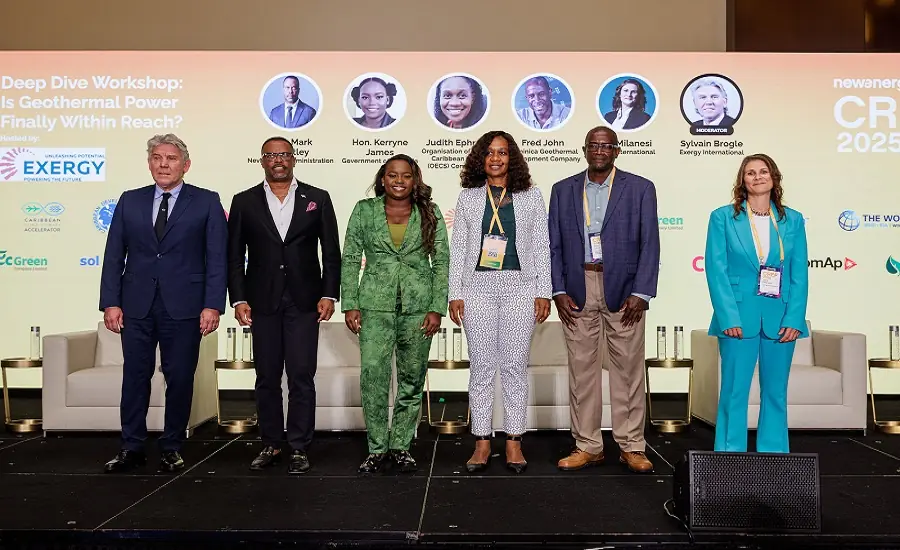The Organisation of Eastern Caribbean States (OECS) reaffirmed its leadership in advancing geothermal energy across the region at the 17th Caribbean Renewable Energy Forum (CREF), held in Miami, Florida. CREF is the Caribbean’s largest annual gathering for clean energy stakeholders, drawing government leaders, utilities, investors, and innovators to accelerate the region’s energy transition.
The OECS Commission’s delegation was led by Judith Ephraim-Schmidt, Director of Sustainable Energy, who joined a high-level panel discussion hosted by clean energy equipment supplier, Exergy International, and moderated by Sylvain Broglé, Business Advisor to Exergy. The session, titled Is Geothermal Power Finally Within Reach?, featured a distinguished group of regional leaders and experts: the Honourable Mark Brantley, Premier of Nevis; the Honourable Kerryne James, Minister of Climate Resilience, the Environment and Renewable Energy, Government of Grenada; Fred John, Managing Director of the Dominica Geothermal Development Company; and Sara Milanesi, Head of Marketing and Communications at Exergy International.
The panel focused on the growing viability of geothermal energy as a clean, reliable baseload power source for the Caribbean. Progress was highlighted in Dominica’s ongoing development of a geothermal plant, expected to be completed by December, and forthcoming drilling in St Kitts and Nevis, both of which signal strong momentum for the sector. Grenada plans to commence exploration drilling in 2026. The need for innovative financing models and enhanced regional collaboration to accelerate deployment and shorten project timelines was also addressed.
Progress in geothermal development was highlighted, including Dominica’s forthcoming geothermal plant and upcoming drilling in St Kitts and Nevis, with Grenada set to commence exploration in 2026. The panel emphasised the need for innovative financing, regional collaboration, and capacity building to accelerate deployment and ensure long-term success of geothermal projects.
Premier Brantley stressed the pivotal importance of geothermal energy in enabling small island developing states to establish clean, dependable, and sustainable energy infrastructure. He provided the latest developments on the St. Kitts and Nevis Geothermal Energy Project, noting its transformative prospects not just for Nevis, but for the entire Federation and the wider regional electricity network. Premier Brantley also called for swift action to meet both national and regional renewable energy targets, highlighting the urgency of this transition.
Minister James provided a compelling vision for the transformative potential of geothermal energy in Grenada and ultimately the region:
“If successful, the 15-megawatt base load capacity [geothermal plant] will provide 40 per cent of our energy supply needed for all households in Grenada. It has been a long journey to get to where we are—two-and-a-half years sometimes feel like ten… but we are staying the course. We are ensuring that no community is left behind… The technical aspect of the project takes a while but we want to ensure that all citizens are in tune.”
She also highlighted the value of regional collaboration through the OECS Geothermal Energy Capacity Building for Utilisation, Investment and Local Development (OECS GEOBUILD) Programme:
“OECS in the whole process with the GEOBUILD project… has been giving us the advantage and the environment for us to learn and grow from our regional partners… It has the potential of giving us not only energy security (but) the opportunity to redefine regional integration; redefine how we collaborate amongst ourselves in the region.”
The forum stressed the importance of the GEOBUILD Programme in capturing lessons learned and building local expertise, ensuring that future geothermal projects benefit from shared regional knowledge and best practices.




